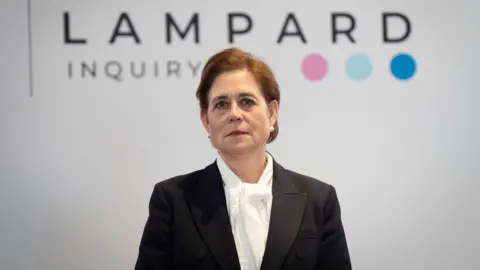Mental health patient data covered up - families
 PA Media
PA MediaFamilies of patients who died under the care of a mental health trust have criticised authorities of a "cover-up" at a landmark public inquiry.
The Lampard Inquiry is looking into the deaths of more than 2,000 people who died while being cared for by NHS services in Essex between 2000 and 2023.
Speaking on behalf of bereaved families, Brenda Campbell KC said patient records were "routinely incomplete, inaccurate, inconsistently completed or, in some cases, falsified".
The Essex Partnership University NHS Foundation Trust [EPUT] has already apologised to families at the inquiry.
It is the first public inquiry in England to examine deaths of mental health patients.
'Repeated failures'
Ms Campbell told Baroness Lampard: "Where some individual records are incomplete or are inaccurate, the cornerstone has been laid for failures in care.
"But where records are routinely incomplete, inaccurate, inconsistently completed or, in some cases falsified - in ward after ward, hospital after hospital, year after year - notwithstanding NHS guidance or Care Quality Commission recommendations or coroner's prevention of future death reports - from the perspective of the families that we represent, that enables a cover-up."
She continued: "It enables systemic issues of patient safety to be hidden, it covers up repeated failures in staff training and care, it masks poor management and gaps in accountability."
Ms Campbell issued a joint statement on behalf of families represented by Bhatt Murphy Solicitors, Bindmans LLP, Bates Wells, Leigh Day LLP and Irwin Mitchell.
She called for the identities to be made public of those who had received Section 21 notices - ordering them to submit evidence to the inquiry.
 PA Media
PA MediaStephen Snowden KC, representing bereaved families on behalf of Hodge Jones & Allen, criticised the inquiry for not providing full disclosure of materials to them in advance.
Jane Lassey, the director of regulation at the Health and Safety Executive, spoke at the inquiry on Tuesday.
But Mr Snowden likened her evidence to "lifting the lid of a box very slightly without telling us what might be in it, peeking in, and then - without any opportunity to lift the lid further - closing the lid again".
"That, we hope, is not going to be the way that witnesses are going to be questioned in the future," he told Baroness Lampard.
'Still waiting'
The inquiry heard more about incomplete data being submitted to its team by health bodies including EPUT and the Priory Group.
Historical data on absconsions and ligature points is still being compiled by both organisations and is expected to be submitted to the inquiry in June.
Kirsty Lea, counsel to the inquiry, said that incomplete data could prevent the inquiry from reaching key decisions, and it was still waiting for "significant disclosure" from health authorities.
"Only once the inquiry is satisfied that it has the fullest available data will it be able to conclude whether or not a comprehensive review across the entire relevant period is even possible," Ms Lea said.
"If the conclusion is that such a review is not possible, that - in itself - will be informative."
Paul Scott, chief executive of EPUT, told the BBC in a statement: "As the inquiry progresses there will be many accounts of people who were much loved and missed over the past 24 years and I want to say how sorry I am for their loss.
"All of us across healthcare have a responsibility to work together to improve care and treatment for all and to build on the improvements that have already been made over the last 24 years."
Evidence is due to continue until 15 May and will resume in July.
Baroness Lampard is expected to produce her recommendations for change in 2027.
Follow Essex news on BBC Sounds, Facebook, Instagram and X.
